How Google Uses Data to Personalize Search Results
One of the cornerstones… well that doesn’t quite do it justice… the very DNA of SEO is the intrinsic value of keywords in relation to content. Everything is built on keywords, and we’ve been worshipping them like ancient idols in long lost civilizations… We’ve tracked our keywords religiously like we do fantasy football stats (damn you Tyreek Hill), every change in number value – every week. We’ve latched on to the essence of the phrase, the perfect combination of letters in some set order to give us an expected volume of searches. We know this way of typing something in gives us this number of users looking for this very thing. The system has something we need – quantification.
For marketers, we need this quantification to give us milestones to report on. I don’t think the system is inherently wrong, it’s just decidedly… myopic. It’s half the equation and if we continue to focus on the explicit nature of a thing, we miss out of the implicit meaning behind it. These are people doing the searching, and we need to think of the people-side more in search marketing.
We’ve tracked our keywords religiously like we do fantasy football stats (damn you Tyreek Hill), every change in number value – every week. We’ve latched on to the essence of the phrase, the perfect combination of letters in some set order to give us an expected volume of searches. We know this way of typing something in gives us this number of users looking for this very thing. The system has something we need – quantification.
For marketers, we need this quantification to give us milestones to report on. I don’t think the system is inherently wrong, it’s just decidedly… myopic. It’s half the equation and if we continue to focus on the explicit nature of a thing, we miss out of the implicit meaning behind it. These are people doing the searching, and we need to think of the people-side more in search marketing.
Implicit vs Explicit Searches
At the core of the issue is the structure of a search. Every search is a two part equation. Tom Anthony gives a great breakdown and puts it into a math formula.Math and SEO? 
The Equation
It’s a simple idea but it speaks volumes as to the nature of a query. If we accept this hypothesis, then we must accept that the puzzle is made of multiple pieces that are tied together. We’ve turned our collective heads in Plato’s cave, we’ve seen the hands and the fire and we can no longer accept that reality.Search Query = (Explicit Aspect + Implicit Aspect)
 A bit dramatic? Probably… my personality doesn’t really allow for writing “consider this” commentary. But regardless of my flare for the hyperbolic, the point still stands. We cannot go back to just accepting a keyword as the explicit function of a question. Consider my current situation needing to find a new dentist after a recent move:
A bit dramatic? Probably… my personality doesn’t really allow for writing “consider this” commentary. But regardless of my flare for the hyperbolic, the point still stands. We cannot go back to just accepting a keyword as the explicit function of a question. Consider my current situation needing to find a new dentist after a recent move:
Consider this from a varying perspective. In your day to day, think of the context in which this question was asked, where you are and who you are talking to:Dentist
{Explicit}
If you’re speaking to a child doing a report, it might be “what does a dentist do?” If you’re speaking to a school counselor, it could be “what does it take to become a dentist?” If you’re new to an area and need to get your teeth cleaned like me, then it’s “where are some nearby dentists who are well liked and have a decently nice location so I don’t feel like I’m walking into a kidney donation center and so I don’t have to worry about it for another 6 months?”The point is context matters. If you look at it from Google’s perspective, they have to build that context with the resources at its disposal. To them, the query looks a little different:
With these clues they can assume since I’m in Portland and I’m perusing on my phone, I may want to look for a nearby location to call. They provide not only some nearby examples, but hours, numbers, and rankings:Dentist
{Explicit}
Device=mobile, location=portland
{Implicit}
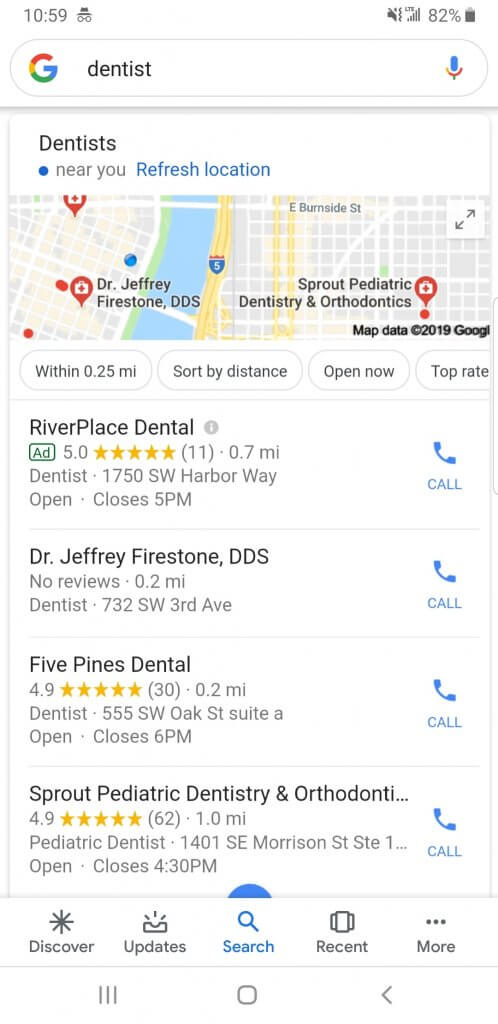 Compare that to a desktop search and you can see they do not line up the same or even have the same results:
Compare that to a desktop search and you can see they do not line up the same or even have the same results:
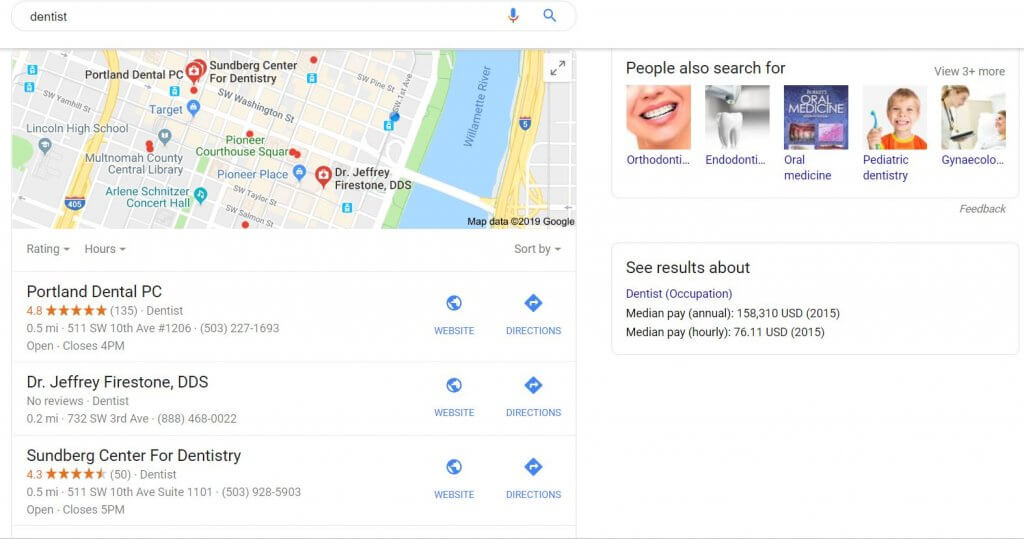 This is taking into consideration only a couple of factors, not including the 200 other rankings factors, Hummingbird algorithm suggestions, past searches, the results people clicked on who meet similar demographics… you start to get a pretty disparate SERP.
This is taking into consideration only a couple of factors, not including the 200 other rankings factors, Hummingbird algorithm suggestions, past searches, the results people clicked on who meet similar demographics… you start to get a pretty disparate SERP.
Hummingbird and Search Implications
Speaking of the algorithm, I think it helps to provide some insight into what Hummingbird was intended to do, and how that intention shaped SERPs. Hummingbird has been around for a little while now and while it is also changing and evolving, it has already made a drastic impact on what shows up when you make a search query. Before you might expect very on-the-nose answers that mirror a Spock interaction more than a human conversation. These were useful in building an idea of what searchers wanted, but it was missing a piece. The conversational element of the thing was a more difficult proposition. Think about it like you would a normal day-to-day interaction. How would you describe sarcasm to an alien? How do you describe slang across cultures? You need not only to understand the nature of the thing being asked, but you need to understand the cultural cues surrounding the phrase and pick up on inflection and current zeitgeists. That’s a lot for an outsider to grasp.
The way to do it is through examples, and Google was compiling lots and lots of examples. So, what were the goals of the update?
These were useful in building an idea of what searchers wanted, but it was missing a piece. The conversational element of the thing was a more difficult proposition. Think about it like you would a normal day-to-day interaction. How would you describe sarcasm to an alien? How do you describe slang across cultures? You need not only to understand the nature of the thing being asked, but you need to understand the cultural cues surrounding the phrase and pick up on inflection and current zeitgeists. That’s a lot for an outsider to grasp.
The way to do it is through examples, and Google was compiling lots and lots of examples. So, what were the goals of the update?
Conversational Search
People tend to ask things in a way they might ask colleagues or family. Search engines needed a way to respond to the way a searcher would search for answers and not require them to speak a secondary “search engine” language. Hummingbird aimed to tackle the semantics of questions and look at the bulk of queries instead of isolating a single line of text. As search marketers, we need to be aware of this element of search. From the lion’s mouth, Google reports a 65% increase in “do I need” searches in the last 2 years, a 65% growth in “should I” searches and an 85% growth in “can I” searches. Conversational keywords are integral to a holistic search strategy.Voice Search
A function of conversational searches, voice-to-text technology incorporates the function of translating language into text and the nuances of implicit search queries. This is primarily a mobile technology which has crept into the forefront of local searches and local SEO. A person looking for a dentist on their phone might speak “dentist” into their search bar. These users aren’t looking for what a dentist is or the best dentist in Newark New Jersey (unless they live there), they want to know where local dentist offices are located in their area. This is being more and more integrated into Voice Assistant technology as well. Implicit Invocation is the idea of activating a function by utilizing non-Action terminology, and prompting the function to fulfill that request in the best possible way. If a user wants a chicken soup recipe, the technology can either list off the knowledge graph in the SERP or activate a Personal Chef app. How does your service fall into the voice-activated search index?Local SEO
We’ve alluded to it, but the biggest impact implicit search queries have had are on the local SEO scene. Google has declared location/geo modifiers to be a non-issue going forward. The idea was entirely rooted in implicit queries: utilizing the implied without requiring specific terminology for search. Does that mean we remove the very idea of optimizing for variations on a keyword? Not exactly. This article from Search Engine Land paints an interesting portrait of the possible variations to SERPs based on the language of a search query. The fact we can get varying results from the same “implicit” search means there is still value in the “explicit” part. The equation may be weighted differently depending on the search, but it still takes two to tango. Maximizing your visibility means approaching your SEO strategy from all angles. Think of the “snackbox” on local searches. Google has curated content specifically off of implicit evaluation. While a healthy 33% of clicks go to this “snackbox”, 40% go to the Organic search results. There is still value in getting both aspects of your SEO strategy in order to capture all possible visibility points. It isn’t enough to focus on one and not the other.Site Schema
While not exactly a goal for Hummingbird, site schema is nonetheless an important element of implicit search functionality and it would be irresponsible not to at least mention it. Marking up your content with rich data is almost necessary to local SEO efforts. While not a ranking factor, it helps improve targeting for search engines. It makes sense, the more information on a subject, the easier it is to categorize, the more likely it is to show up in certain queries. It’s like a meta description, not directly related to ranking but if it helps users get a better picture of the content available… they are more likely to click (and clicks do help). This isn’t just postulating, site schema improves CTR. The implicit value of ratings, location, and other factors is an important consideration when Google determines which listings to populate their SERP with. If these factors are valued by customers beyond what they actually type in, you have to take notice.Implicit Search Queries in Regular Organic Search
Implicit isn’t an unspoken word only to be used in the inner circles of local SEO… There is more to understanding the value of implicit search queries on a national (or international) SEO strategy.
We talk about “Intent” quite a bit in the SEO world. I typically include it in some column in my keyword research, subjectively applying purchasing funnel evaluations based on my own feelings.
There is more to understanding the value of implicit search queries on a national (or international) SEO strategy.
We talk about “Intent” quite a bit in the SEO world. I typically include it in some column in my keyword research, subjectively applying purchasing funnel evaluations based on my own feelings.
 Product pages are easy, if my client makes a time tracking software then “time tracking software” is a great keyword. The user is likely looking for exactly what I offer and they are likely intending to find information on that software. Implicit and Explicit are aligned.
But people don’t just look for products, they look for solutions. If I was in the business of looking for a time-tracking software, what do you think my reasonings would be? Maybe I’m bad at personal time management and I need a system to help.
Product pages are easy, if my client makes a time tracking software then “time tracking software” is a great keyword. The user is likely looking for exactly what I offer and they are likely intending to find information on that software. Implicit and Explicit are aligned.
But people don’t just look for products, they look for solutions. If I was in the business of looking for a time-tracking software, what do you think my reasonings would be? Maybe I’m bad at personal time management and I need a system to help.
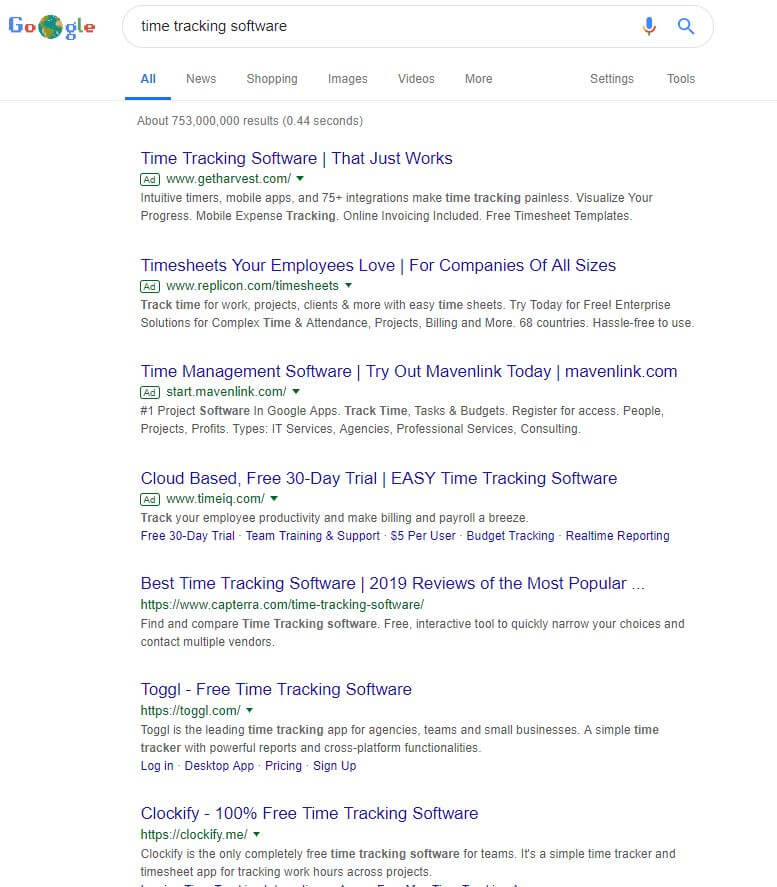 What if I’m an employer and I need to keep timecard for a bunch of people? How do you think those searches might change?
What if I’m an employer and I need to keep timecard for a bunch of people? How do you think those searches might change?
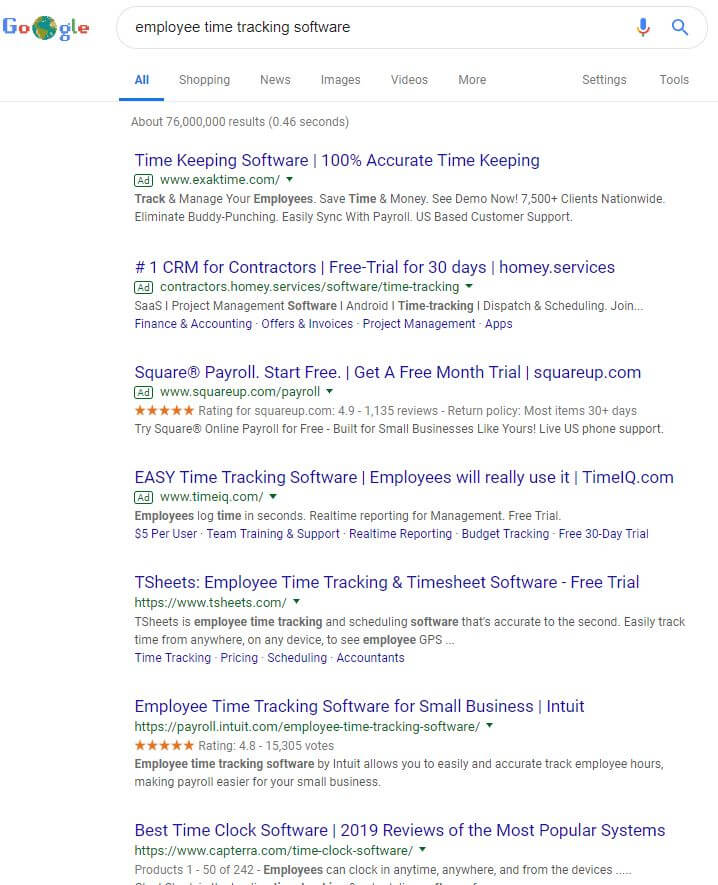 If I was to add one word, “employee time tracking software” you see a dramatic difference in the SERP. Not only are the paid ads different but we are seeing organic listings go from cute sounding Toggl and Clockify to more business focused results like TSheets and Intuit. The meta data also takes a stark turn from “simple” to “accurate”. The implication is we are switching from a small company looking for an easy fix, to a larger company looking for precise time cards.
Not only that, but we see the “free” terminology shift over to “best”. It seems intuitive to the person searching but look at it from the content creators perspective. You go from a simple app on your desktop to a full-fledged HR software for your business just by adding “employee”. Explicitly, they can be the same thing (I can be an employee and use it for work personally) but implicitly they are entirely different platforms that need different functionalities.
Reviewing the SERP is important when deciding how you want to tackle keyword prioritization in SEO strategy. You aren’t just providing your service you’re providing a solution to a problem. This is marketing 101, benefits over features. Continuing our exercise on time tracking software, what sort of things would someone looking for that product be researching? What about time management?
If I was to add one word, “employee time tracking software” you see a dramatic difference in the SERP. Not only are the paid ads different but we are seeing organic listings go from cute sounding Toggl and Clockify to more business focused results like TSheets and Intuit. The meta data also takes a stark turn from “simple” to “accurate”. The implication is we are switching from a small company looking for an easy fix, to a larger company looking for precise time cards.
Not only that, but we see the “free” terminology shift over to “best”. It seems intuitive to the person searching but look at it from the content creators perspective. You go from a simple app on your desktop to a full-fledged HR software for your business just by adding “employee”. Explicitly, they can be the same thing (I can be an employee and use it for work personally) but implicitly they are entirely different platforms that need different functionalities.
Reviewing the SERP is important when deciding how you want to tackle keyword prioritization in SEO strategy. You aren’t just providing your service you’re providing a solution to a problem. This is marketing 101, benefits over features. Continuing our exercise on time tracking software, what sort of things would someone looking for that product be researching? What about time management?
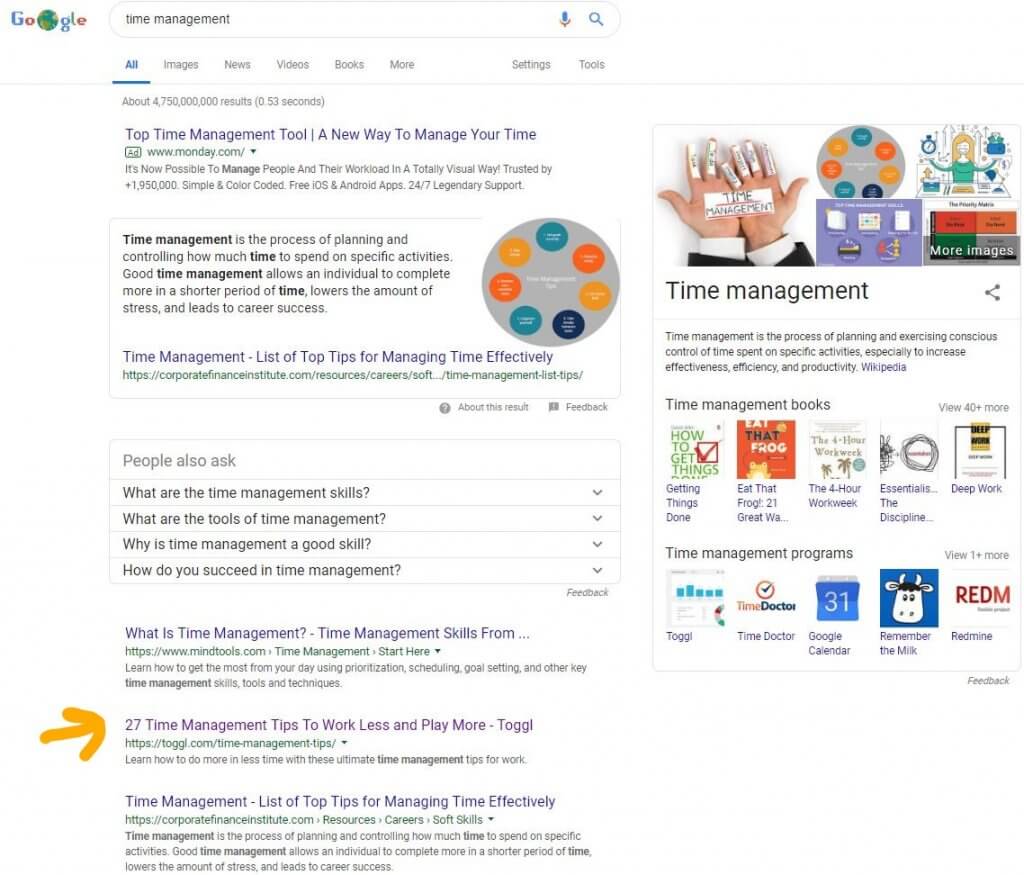 Toggl provides a time-tracking tool yes, but they offer an implied solution to improve someone’s time management. They created content tailored to help answer that question which was related to their service, a solution the searcher needed and a product they might not have considered. $5 says the last line is how a time-tracking software helps with time management…
Toggl provides a time-tracking tool yes, but they offer an implied solution to improve someone’s time management. They created content tailored to help answer that question which was related to their service, a solution the searcher needed and a product they might not have considered. $5 says the last line is how a time-tracking software helps with time management…
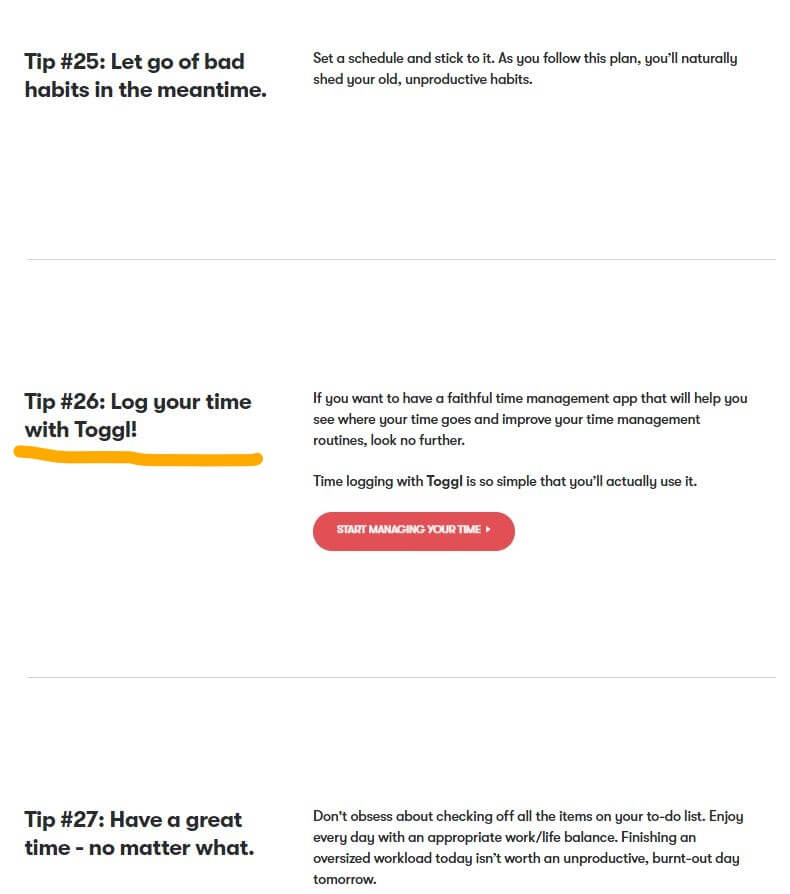 Ok so it’s technically the second-to-last but we’ll call it a tie on good faith (plus I still need bus fare for tomorrow).
The point is that we marketers need to avoid seeing the forest for the trees (second time I’ve used that basic-ass metaphor). Going beyond keywords and answering conversational questions. Measuring page engagements with the same vigor as rankings. Building out content strategies on more than just search volume and product offerings. A world without nuance and inflection is just a string of 1’s and 0’s, so why bother only doing the robot’s part?
Ok so it’s technically the second-to-last but we’ll call it a tie on good faith (plus I still need bus fare for tomorrow).
The point is that we marketers need to avoid seeing the forest for the trees (second time I’ve used that basic-ass metaphor). Going beyond keywords and answering conversational questions. Measuring page engagements with the same vigor as rankings. Building out content strategies on more than just search volume and product offerings. A world without nuance and inflection is just a string of 1’s and 0’s, so why bother only doing the robot’s part?
What’s on your mind?
"*" indicates required fields
